#zohocrm
Explore tagged Tumblr posts
Text
Zoho CRM Consulting Services Experts | AGSuite | Pune | India
AGSuite Technologies offers expert Zoho CRM Consulting Services to help you streamline sales, automate workflows, and boost customer engagement. Maximize your ROI with tailored Zoho solutions.
0 notes
Text
Why Fast-Growing Startups Are Switching to Zoho CRM in 2025
In 2025, the startup world is moving faster than ever—and the tools they choose can either propel growth or stall momentum.
That’s why so many fast-growing startups in the USA are making a strategic shift: they’re switching to Zoho CRM.
If you’re scaling fast, juggling leads, managing a remote sales team, and trying to stay ahead of the curve—you need more than a CRM. You need a growth engine. And Zoho CRM is delivering just that.

🚀 Why Startups Are Flocking to Zoho CRM
1. Built for Speed—and Scale
Startups don’t have time for long learning curves. Zoho CRM’s clean interface, drag-and-drop customizations, and smart automation features make it incredibly easy to set up and scale—without needing a full-time admin.
2. Affordability Without Compromise
Budget-conscious doesn’t have to mean feature-starved. Zoho CRM offers enterprise-grade functionality at a startup-friendly price. That’s why it's rapidly becoming the top choice for startups in the USA looking for a competitive edge.
3. Everything Under One Roof
Sales, marketing, customer support—Zoho CRM integrates them all. From lead capture to deal closure, every stage of the customer journey is tracked and optimized. No more stitching together scattered tools.
4. AI-Powered Insights with Zia
Zoho CRM’s built-in AI assistant, Zia, helps startups make smarter decisions—forecasting deals, recommending follow-ups, and even detecting anomalies before they become problems.
5. Seamless Integration Ecosystem
Already using Slack, Gmail, or QuickBooks? Zoho CRM connects with your stack effortlessly, keeping your systems talking and your team aligned.
🌎 Why Zoho CRM USA is Booming
Startups in competitive U.S. markets—from tech hubs like Austin and Chicago to emerging scenes like Raleigh and Denver—are realizing that agility is everything. Zoho CRM’s adaptability, low cost, and local support make it a perfect fit for the U.S. startup ecosystem.
💡 The Smartest Startups Aren’t Waiting
If you’re still on spreadsheets or stuck with an outdated CRM, you’re already behind. The most forward-thinking founders are already using Zoho CRM solutions to accelerate pipeline growth, automate lead nurturing, and gain 360-degree visibility on customers.
🔧 Ready to Make the Switch?
At Avion Technology, we help startups implement and customize Zoho CRM to fit their growth goals. From setup to automation and integrations—we’ve got you covered.
👉 Start your Zoho CRM journey with us today.
Contact us today Let’s build smarter, scale faster, and sell better—together.
#technology#aviontechnology#services#ZohoCRM#ZohoCRMUSA#CRMsolutions#StartupGrowth#SalesAutomation#SmartSelling#BusinessScaling#DigitalTransformation#CustomerSuccess
0 notes
Text
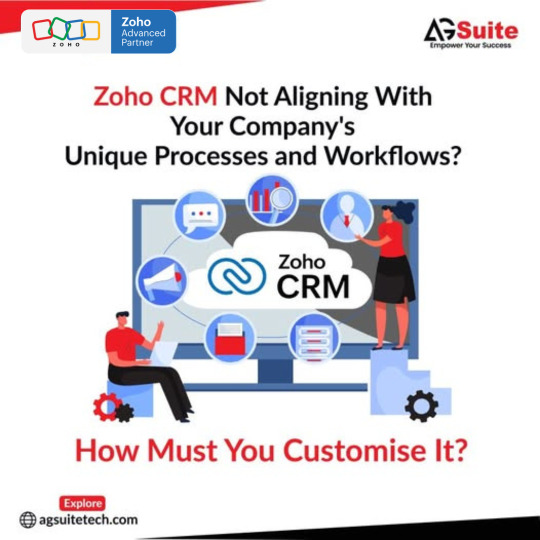
Zoho CRM Not Aligning With Your Company’s Unique Processes and Workflows?
It can be frustrating when your CRM doesn't work the way you need it to. But don't worry, there's a solution! Customizing your Zoho CRM can help align it with your specific business needs and make your work much smoother. At AGSuite Tech, we understand the importance of having a CRM that adapts to your company's way of doing things. Our team of experts specializes in customizing Zoho CRM to match your unique processes and workflows. Whether you need to add custom fields, create new modules, or integrate with other systems, we've got you covered. With our tailored approach, you can optimize your Zoho CRM to work seamlessly with your business, saving you time and improving efficiency. Visit agsuitetech.com to learn more about how we can help you customize your Zoho CRM for success.
Read more: https://agsuitetech.com/zoho-crm/
0 notes
Text

https://prophecytechs.com/crm
#CRM#CloudCRM#SmallBusinessCRM#EnterpriseCRM#CustomerSuccess#SalesAutomation#MarketingAutomation#CRMSoftware#BusinessGrowth#DigitalTransformation#CustomerExperience#USAStartups#EnterpriseSolutions#Salesforce#HubSpot#ZohoCRM#MicrosoftDynamics#CRMSolutions#BusinessTools#CustomerEngagement
0 notes
Text
Zoho CR vs. Salesforce
𝗭𝗼𝗵𝗼 𝗖𝗥𝗠 vs. 𝗦𝗮𝗹𝗲𝘀𝗳𝗼𝗿𝗰𝗲: 𝘞𝘩𝘪𝘤𝘩 𝘖𝘯𝘦 𝘍𝘪𝘵𝘴 𝘠𝘰𝘶𝘳 𝘉𝘶𝘴𝘪𝘯𝘦𝘴𝘴 𝘉𝘦𝘴𝘵? 🤔
Choosing the right CRM is not about 𝗳𝗲𝗮𝘁𝘂𝗿𝗲𝘀. It’s about finding the perfect match for your business needs.
𝗭𝗼𝗵𝗼 𝗖𝗥𝗠 – 𝘈𝘧𝘧𝘰𝘳𝘥𝘢𝘣𝘭𝘦, 𝘦𝘢𝘴𝘺 𝘵𝘰 𝘶𝘴𝘦, 𝘢𝘯𝘥 𝘱𝘢𝘤𝘬𝘦𝘥 𝘸𝘪𝘵𝘩 𝘢𝘶𝘵𝘰𝘮𝘢𝘵𝘪𝘰𝘯 & 𝘢𝘯𝘢𝘭𝘺𝘵𝘪𝘤𝘴. 𝘈 𝘨𝘳𝘦𝘢𝘵 𝘤𝘩𝘰𝘪𝘤𝘦 𝘧𝘰𝘳 𝘴𝘮𝘢𝘭𝘭 𝘵𝘰 𝘮𝘪𝘥-𝘴𝘪𝘻𝘦𝘥 𝘣𝘶𝘴𝘪𝘯𝘦𝘴𝘴𝘦𝘴.
𝗦𝗮𝗹𝗲𝘀𝗳𝗼𝗿𝗰𝗲 – 𝘈𝘐-𝘱𝘰𝘸𝘦𝘳𝘦𝘥, 𝘩𝘪𝘨𝘩𝘭𝘺 𝘴𝘤𝘢𝘭𝘢𝘣𝘭𝘦, 𝘢𝘯𝘥 𝘭𝘰𝘢𝘥𝘦𝘥 𝘸𝘪𝘵𝘩 𝘢𝘥𝘷𝘢𝘯𝘤𝘦𝘥 𝘧𝘦𝘢𝘵𝘶𝘳𝘦𝘴. 𝘐𝘥𝘦𝘢𝘭 𝘧𝘰𝘳 𝘦𝘯𝘵𝘦𝘳𝘱𝘳𝘪𝘴𝘦𝘴 𝘭𝘰𝘰𝘬𝘪𝘯𝘨 𝘧𝘰𝘳 𝘢 𝘳𝘰𝘣𝘶𝘴𝘵 𝘴𝘰𝘭𝘶𝘵𝘪𝘰𝘯.
Which one’s the right fit for you?
See the full breakdown before you decide: https://www.webuters.com/zoho-crm-vs-salesforce
Still unsure? Let’s talk: https://www.webuters.com/contact-us
1 note
·
View note
Text

Discover how Zoho empowers sales teams with its robust sales enablement tools! From real-time customer engagement to task automation and centralized document management, learn how Zoho CRM transforms sales processes. Click to read and boost your sales productivity today!
#SalesEnablement#ZohoCRM#BoostSales#SalesTools#RealTimeEngagement#TaskAutomation#CRMSoftware#SalesProductivity#BusinessGrowth#SalesSuccess
0 notes
Text
#business intelligence#erp#erp solution bd#erp software#microsoft dynamics crm#zohocrm#microsoft#microsoft dynamics 365#microsoftdynamics#zoho crm
0 notes
Text
Optimize Sales Performance with Zoho CRM: Analyze Sales Data, Identify Opportunities, and Forecast Revenue Precision

Sales performance is the lifeblood of any business, and to remain competitive, businesses must go beyond managing customer data—they need to harness the power of analytics, streamline operations, and forecast revenue with accuracy. Zoho CRM offers a comprehensive solution designed to empower sales teams to analyze data effectively, identify key opportunities, and make well-informed, strategic decisions. Let’s explore how Zoho CRM can help transform your sales performance and set your business on the path to success.
1. Unleash the Power of Data-Driven Sales Analytics
Zoho CRM delivers robust data analytics, giving you a 360-degree view of your sales activities. Its customizable dashboards and detailed reports allow you to monitor key metrics and make data-driven decisions effortlessly.
Track Key Metrics: Visualize your sales performance with real-time dashboards tracking lead conversions, customer touchpoints, and overall sales progress.
Customer Insights: Leverage data on customer behavior, buying patterns, and preferences to tailor your approach, improving both engagement and conversion rates.
Data-Driven Decisions: By understanding sales trends and customer needs, your team can adjust strategies quickly, resulting in more accurate targeting and faster deal closures.
2. Identify and Capitalize on Revenue Opportunities
Zoho CRM helps you do more than manage contacts; it enables you to turn insights into actionable opportunities. Through powerful tools like lead scoring, automation, and pipeline management, you’ll be able to zero in on high-potential leads and maximize your revenue.
Lead Scoring and Prioritization: Automatically rank and prioritize leads based on engagement and interaction history, ensuring your sales team focuses on those with the highest conversion potential.
Pipeline Transparency: Gain complete visibility into your sales pipeline, from prospecting to closing. Instantly spot bottlenecks and take action to keep deals moving forward.
Automation to Save Time: Automate repetitive tasks like follow-up emails and reminders, freeing up your sales team to spend more time building relationships and closing deals.
3. Accurate Sales Forecasting for Smarter Planning
Zoho CRM’s advanced forecasting tools help you predict revenue more accurately, aligning your sales strategy with future business objectives. With customizable and real-time updates, your forecasts become a vital tool for guiding decision-making and ensuring steady growth.
Custom Forecasting: Create detailed forecasts based on specific criteria like sales teams, regions, products, or time periods for a clearer view of potential revenue streams.
Real-Time Adjustments: As your pipeline evolves, your forecasts update in real-time, giving you the most current and precise outlook on revenue.
Team-Based Forecasting: Empower your teams to build their own forecasts, encouraging accountability while improving accuracy at every level of the sales organization.
4. Enhance Team Collaboration for Seamless Sales Operations
Effective sales performance isn’t just about individual efforts—cross-team collaboration is essential. Zoho CRM fosters better communication across departments, ensuring everyone is aligned and working toward shared goals.
Integrated Communication Tools: With built-in chat, document sharing, and notes, Zoho CRM allows seamless collaboration between sales, marketing, and customer service teams.
Shared Calendars and Task Management: Manage schedules, tasks, and deadlines across teams to ensure smooth and coordinated sales operations from lead generation to closing.
5. Leverage Zoho’s Ecosystem for Greater Integration
Zoho CRM integrates effortlessly with the rest of the Zoho ecosystem, as well as popular third-party applications like Google Workspace, QuickBooks, and Mailchimp, NetSuite ERP, Microsoft 365 & more. This gives your business a centralized hub for managing all essential tools and processes.
End-to-End Integration: Whether you need email marketing, invoicing, or project management, Zoho CRM works harmoniously with other Zoho apps and third-party tools to create an all-in-one sales solution.
Customizable Workflows: Streamline your workflows by integrating different tools into Zoho CRM, ensuring no steps are missed and everything works in sync.
Drive Sales Success with Zoho CRM
Optimizing sales performance requires more than just effort—it requires the right technology. Zoho CRM provides your sales team with everything they need to succeed: robust analytics, pipeline visibility, automation, and accurate forecasting. These powerful tools enable your team to close deals faster, focus on high-impact opportunities, and drive consistent revenue growth. If you’re ready to take your sales to the next level, Integs Cloud is here to help you implement and customize Zoho CRM to meet your specific business needs. Our team of Zoho experts will ensure you get the most out of your CRM, enhancing productivity and driving real results.
#SalesSuccess#ZohoCRM#BusinessGrowth#DataDrivenSales#CRMStrategy#SalesAutomation#IntegsCloud#BusinessIntelligence#Zoho#CRM#BusinessInsights#BusinessEfficiency#Automation#SaaS#Enterprise#Tech#Technology#Software#DataManagement#BusinessSolutions#DataIntegration#ProductivityTools#SmartBusiness
0 notes
Text
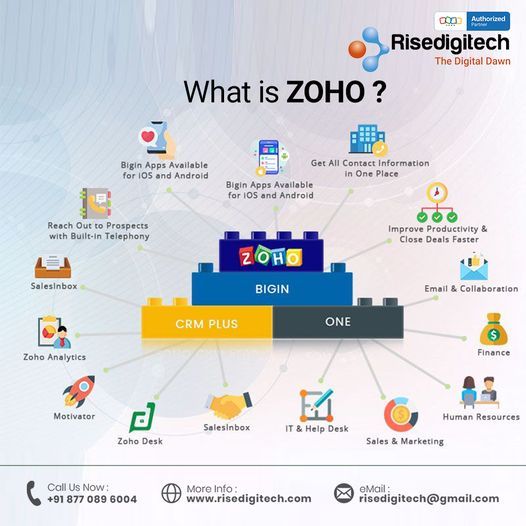
Zoho is a cloud-based software suite designed to help businesses manage operations efficiently. Founded in 1996, it offers tools for CRM, accounting, project management, email, and more. Key products include Zoho CRM, Zoho Books, and Zoho Projects, all designed to integrate seamlessly.
Call us: +91 8770896004
#Zoho#CloudSoftware#BusinessManagement#CRM#Accounting#ProjectManagement#SmallBusiness#ZohoBooks#ZohoCRM#Productivity#BusinessTools
0 notes
Text
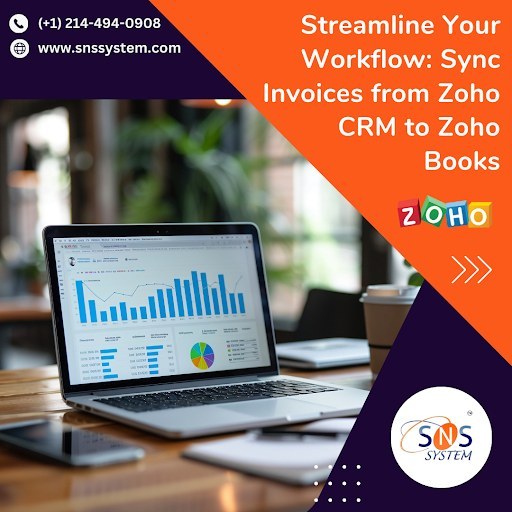
Seamless Integration: Sync Invoices with Zoho CRM and Zoho Books
Tired of manual data entry? Our Zoho CRM extension automates invoice syncing, saving you time and reducing errors. Seamlessly transfer invoices from CRM to Books with just a few clicks. Experience the power of integration and streamline your business processes.
Key Benefits:

Contact SNS System today! Let's discuss how our Zoho CRM extension can transform your business.
Link: https://snssystem.com/.../sync-invoice-in-zoho-books.../ https://snssystem.com
#ZohoCRM#ZohoBooks#InvoiceSync#AutomatedIntegration#SeamlessWorkflow#ReduceErrors#BusinessEfficiency#DataAutomation#StreamlinedProcesses#ZohoExtensions#SaveTime#ImproveAccuracy#SNSSystem#EnhancedDataManagement#CRMIntegration#business#marketing
0 notes
Text
Transform Your Business with the Leading Zoho Partner in Australia
Searching for a reliable Zoho partner in Australia to elevate your business operations? Look no further! Here's why partnering with us can be a game-changer for your organisation:
Tailored Solutions: As a leading Zoho partner in Australia, we offer customised solutions to meet your specific business needs. Whether you’re in sales, marketing, finance, or customer service, we've got you covered.
Expert Guidance: Our team of Zoho-certified experts provides top-notch consultation and support, ensuring a seamless integration of Zoho’s powerful tools into your existing systems.
Comprehensive Services: From Zoho CRM implementation to advanced Zoho CRM Automation, we handle it all. Our expertise extends to Zoho Books, Zoho Desk, Zoho Projects, and more, making us the go-to Zoho partner in Australia for comprehensive solutions.
Scalable Growth: Whether you’re a startup or an established enterprise, our solutions are scalable, and designed to grow with your business. We help you unlock the full potential of Zoho’s extensive software suite.
Local Support: Being a Zoho partner in Australia, we understand the unique challenges faced by Australian businesses. Our local support team is always ready to assist, providing timely solutions tailored to your market.
Ready to take your business to the next level? Contact us now and and experience unparalleled growth and efficiency.
1 note
·
View note
Text
Spotlight: How Zoho Intends to Transform CRM
SMB Group got to chat with key Zoho execs about news and directions in several areas at their Zoholics 2024 customer conference held in June. Zoho unveiled updates and news across its CRM and collaboration solutions, enhancements to its security stack, and new tools and services for developers. In this video, I talk with Prashanth “PVK” Krishnaswami, who heads up Customer Experience solutions at…
0 notes
Text
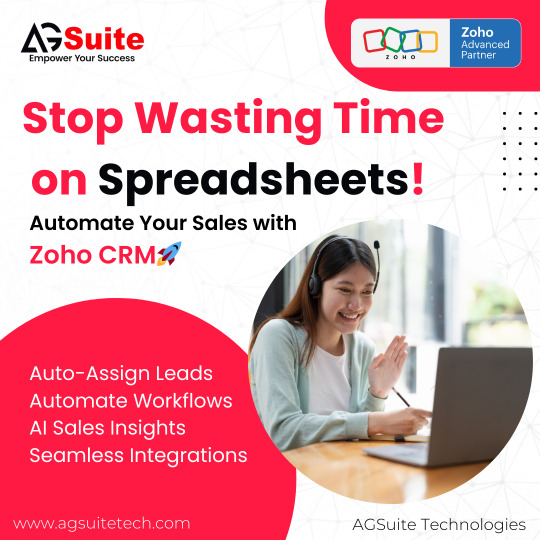
Stop Wasting Time on Spreadsheets: Zoho CRM Automation Tips You Need Now
Are you still juggling spreadsheets to manage your business operations? It’s time to break free from the manual grind and embrace automation with Zoho CRM! As an advanced Zoho partner, AGSuite Technologies brings you expert insights on how to streamline your processes and boost efficiency with Zoho CRM automation.
Why Move Away from Spreadsheets?
While spreadsheets are a familiar tool, they come with limitations like human errors, data silos, and time-consuming updates. Zoho CRM eliminates these challenges, providing a centralized, automated, and real-time solution for managing leads, sales, and customer relationships.
Game-Changing Zoho CRM Automation Tips
• Automate Lead Capture and Assignment • Set Up Blueprint for Sales Processes • Use Workflow Rules to Eliminate Repetitive Tasks • Enable AI-Powered Predictions with Zia • Automate Follow-Ups with Email Sequences • Seamlessly Integrate with Other Zoho Apps • Leverage Macros for Bulk Actions
Read More: https://zurl.co/yyxeD
Take Your Business to the Next Level with Zoho CRM
Stop wasting time on spreadsheets and start leveraging Zoho CRM to drive efficiency and growth. AGSuite Technologies, an advanced Zoho partner, is here to help you implement and optimize Zoho CRM for your business. Get in touch with our experts today and take the first step toward smart automation!
Ready to automate your CRM? Contact AGSuite Technologies now!
Contact Us@ https://zurl.co/POJW9
#ZohoCRM#CRMAutomation#BusinessEfficiency#AutomateYourBusiness#ZohoPartner#AGSuiteTechnologies#SalesAutomation#CRMIntegration#BusinessGrowth#CustomerManagement#SmartBusiness#LeadManagement#WorkflowAutomation#DataManagement#BoostProductivity#SalesPipeline#BusinessSolutions
0 notes
Text
𝐙𝐨𝐡𝐨 𝐂𝐑𝐌: T𝐡𝐞 𝐏𝐨𝐰𝐞𝐫 𝐟𝐨𝐫 𝐒𝐦𝐚𝐥𝐥 𝐁𝐮𝐬𝐢𝐧𝐞𝐬𝐬𝐞𝐬 𝐰𝐢𝐭𝐡 𝐂𝐥𝐨𝐮𝐝𝐲 𝐂𝐨𝐝𝐞𝐫𝐬☁️
At Cloudy Coders, we're passionate about empowering small businesses with the right tools. That's why we love Zoho CRM.
𝐂𝐥𝐨𝐮𝐝𝐲 𝐂𝐨𝐝𝐞𝐫𝐬 𝐜𝐚𝐧 𝐡𝐞𝐥𝐩 𝐲𝐨𝐮:
Choose the right Zoho CRM plan for your business needs.
Implement Zoho CRM seamlessly into your existing workflows.
Customize Zoho CRM to maximize its potential for your business.
Provide ongoing support to ensure you get the most out of Zoho CRM.
𝐑𝐞𝐚𝐝𝐲 𝐭𝐨 𝐭𝐚𝐤𝐞 𝐲𝐨𝐮𝐫 𝐜𝐮𝐬𝐭𝐨𝐦𝐞𝐫 𝐫𝐞𝐥𝐚𝐭𝐢𝐨𝐧𝐬𝐡𝐢𝐩𝐬 𝐭𝐨 𝐭𝐡𝐞 𝐧𝐞𝐱𝐭 𝐥𝐞𝐯𝐞𝐥?
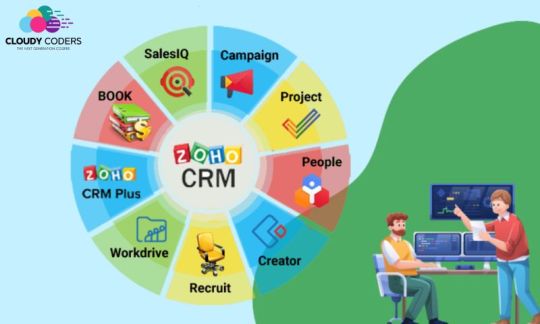
𝐂𝐨𝐧𝐭𝐚𝐜𝐭 𝐂𝐥𝐨𝐮𝐝𝐲 𝐂𝐨𝐝𝐞𝐫𝐬 𝐭𝐨𝐝𝐚𝐲 𝐟𝐨𝐫 𝐚 𝐟𝐫𝐞𝐞 𝐙𝐨𝐡𝐨 𝐂𝐑𝐌 𝐜𝐨𝐧𝐬𝐮𝐥𝐭𝐚𝐭𝐢𝐨𝐧!
Please Visit our Website: https://www.cloudycoders.com/
#ZohoCRM#CRM#SmallBusiness#CloudComputing#CloudyCoders#CustomerRelationshipManagement#SalesforceAlternative
0 notes
Text
Zoho CRM vs HubSpot
Choosing the right 𝗖𝗥𝗠 can make or break your 𝘀𝗮𝗹𝗲𝘀 and 𝗺𝗮𝗿𝗸𝗲𝘁𝗶𝗻𝗴 efforts.
𝗭𝗼𝗵𝗼 𝗖𝗥𝗠 and 𝗛𝘂𝗯𝗦𝗽𝗼𝘁 are two top contenders, but which one best fits your business?
𝗭𝗼𝗵𝗼 𝗖𝗥𝗠: Budget-friendly, highly customizable, and packed with automation. 𝗛𝘂𝗯𝗦𝗽𝗼𝘁: User-friendly, powerful integrations, and great for inbound marketing.
Still unsure which CRM is right for you?
Read our in-depth comparison here: https://www.webuters.com/zoho-crm-vs-hubspot Need expert help? Let’s talk: https://www.webuters.com/contact-us
1 note
·
View note
Text
10 Free CRM Applications That Will Boost Your Productivity
A CRM Application is simply a system that enables firms to manage customer data and interactions, access company information, automate sales, manage vendor and partner connections, and monitor leads, among other functions. The objective is to improve customer service, increase sales, and promote productivity and profitability. A CRM system organizes client data into a single database, making it easier for organizations to access and administer. CRM applications’ broader goals include increasing customer retention, streamlining service delivery, and improving the quality of a company’s relationship with its customers.
Why Use Free CRM Apps?
Free CRM applications can be especially useful for small businesses, startups, and other organisations with limited software budgets. Here are some reasons to use a free CRM app:
Cost-effectiveness: The most obvious advantage is cost savings. Free CRM systems offer essential functionality without the need for a large initial investment. Ease of Adoption: Most free CRMs have a simple interface, making it easier for teams to adopt and integrate the tool into their daily operations. Flexibility: Many free CRM applications have customisable features that can be tailored to a business's specific needs. Risk-Free Trial: Using a free CRM, businesses can evaluate the system's utility and fit without making a financial commitment, serving
10 Free CRM Applications
1. HubSpot CRM
Bitrix24
Zoho CRM
Capsule CRM
Freshsales CRM
EngageBay CRM
Vtiger CRM
Snov.io
Streak CRM
eWay-CRM
Refer to 10 Free CRM Applications for more details.
0 notes